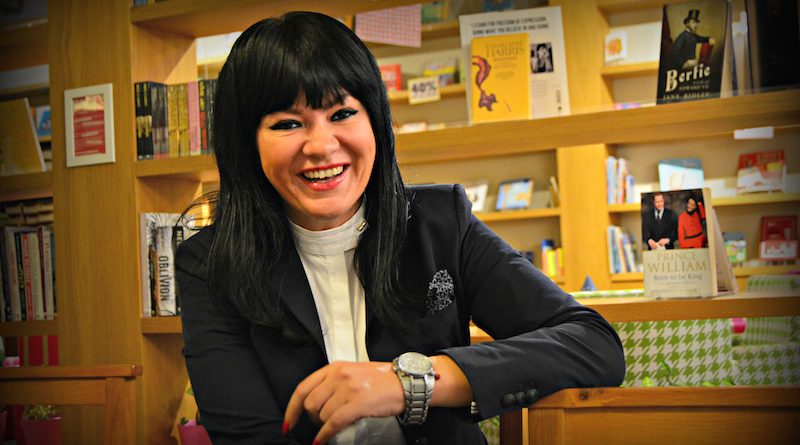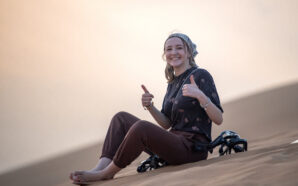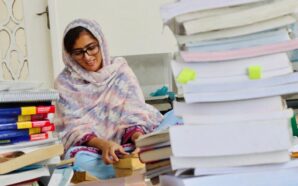Tell us about yourself?
I am a Romanian based in Dubai since 2011. Apart from working as a lawyer corporate / commercial / dispute resolution / international transactions), I am a professor at the University of Wollongong, Dubai, teaching International Law, Diplomacy, Business Law and few other related subjects.
You hold a unique specialty in Space Law, tell us about that.
I am a space enthusiast, which is the why I tried to approach this field from my own perspective – which is Law. In terms of studies, I am a bachelors degree in Law, have a Masters in International Law and several specializations at the European Space Agency, UN, Academies of International Law in Netherlands, Spain, China, India etc. In 2006 I started my PhD in International Law, specializing in International Space Law, at the Romanian Academy in Bucharest. Most of the research for my thesis has been done in the Netherlands.
The moment I pursued my PhD in Space Law, it completely changed my life. I was particularly attracted about the novelty of the Space Law field, about the fact that it is a niche domain (and highly technical) for a jurist and about the fact that it implied a lot of innovation and interdisciplinary approaches. It is a hybrid of public and private law, technical terms, space applications that you need to look at from different perspectives and plenty of government documents, memorandums and even contracts that make the space research and exploration the new purpose of high politics for the centuries to come. Nonetheless, I was and still am attracted by the originality of this domain.
More about me… I love books and animals, shoes, chocolate, mornings and peace. In Dubai I have discovered a new type of introspection, which makes me particularly happy from time to time. I usually try to think about me as being an extremely simple individual. But that’s I believe the most difficult thing to do and the corundum of my full existence.

Space lawyers are jurists by formation, all of them. University professors, researchers, practitioners… all with a specific background, education and career in the field of International Space Law. At this time there are not too many space lawyers in the world due to the particular features of the field, therefore the domain is open and growing.
What is a space lawyer?
Space lawyers are jurists by formation, all of them. University professors, researchers, practitioners… all with a specific background, education and career in the field of International Space Law. At this time there are not too many space lawyers in the world due to the particular features of the field, therefore the domain is open and growing. Some of our fellow colleagues see us being quite posh due to the domain we activate in. It is a tough domain I would say. Plus, it is a particular category of lawyers or jurists (privileged I would say) having as main aim to develop and grow the Space Law field, which – 50 years ago for example – was only a dream. Now it is part of our day to day life and definitely determinant to our future.
What has been the greatest challenge in your professional pursuits?
Of course, any professional pursuit has plenty of challenges of various types. I would look only at the Space Law perspective so far. Greatest challenge …. For me it was research. Starting from difficulties in finding literature or scholarly sources in the Space Law field to finding specialization programs abroad (which are not so many), plus I had a reputation to defend. I was the first student in the Romanian Academy to pursue a PhD in the Space Law field, therefore it was a pioneer work, plus the name of the institution behind me. The Romanian Academy is the most prestigious scientific forum in the country, hence my task has been more sophisticated than I thought. I have tried to put it on the map as doing research in the Space Law field and I hope from the bottom of my heart that I have succeeded.
What milestones have you achieved so far?
“Legal Status of the Outer Space and of the Celestial Bodies” is my first book ever. I have authored articles on the same matter, but nothing compares with a book. This book is my major achievement in the research field so far. A great milestone.
Secondly, I would look back into my professional life. I have been qualified as a lawyer at a very young age (22) and I was lucky to pursue this field from various perspectives: private practice, in house practice or running my own law office back home. Mostly related to international business law matters.
Third, what made me extremely happy and honored was my work at the governmental and intergovernmental level. I had a series of government postings in my country and an appointment in a UN related organization in the Space Law and Policy field. This period of my life has exposed me to the United Nations work, to the International Astronautics Congresses, to Space Generation Congresses and to a world that supported my dreams and made my interest in space to become real.
Fourth, I am teaching. It feels great and it is a great honor for me to spend time and talk to the students, see them interested in various fields and sometimes share with them my experiences in the Space field. It is particularly rewarding for me as an individual.
Middle East and UAE in particular is an amazing promoter of space tech, space science and applications… very technologized society, plenty of companies involved in the field, an active Space Agency, a UAE satellite orbiting now around us… therefore I would consider the UAE as an interesting and important spot on the space map.
Comment on the UAE as well as the Middle East as far as education pertaining to this field is concerned? And what is its relevance in this day and age?
The relevance of space applications is tremendous and continuing to grow: from satellite TV to internet, GPS, phone, Google Earth to more sophisticated technologies, all are coming from, are related to or are based on space applications. These are the minimal usages of space… the ones we can feel and sense every day. Aside from this, saying space we say scientific experiments, telemedicine, remote sensing, emergency response, disasters management – all designed to improve the society we live in and the life we live.
Middle East and UAE in particular is an amazing promoter of space tech, space science and applications… very technologized society, plenty of companies involved in the field, an active Space Agency, a UAE satellite orbiting now around us… therefore I would consider the UAE as an interesting and important spot on the space map.
In UAE, as in many other parts of the world, Space Law or the legal regime of outer space is approached under public international law (it finally constitutes a branch of this broader field). There are already organizations active in the field of education, which have plenty of great results so far, such as the Arab Youth Venture Foundation. There is a lot of space technology implemented, constructed or even in course of being built in the region. The Engineering field when it comes to space is – I believe – well developed due to the amount of business it generates in the region.
When it comes to legal education, the domain is still new and in course of implementation, as in many other parts of the world. However, with the growing usages of space, I personally believe that Space Law should become a distinct area of study for the university students.

Women are already a very solid participant in the space field. From Valentina Tereshkova, the first woman astronaut and the first woman in space, to Anousheh Ansari, the first space tourist.
How can we empower women through this field?
Women are already a very solid participant in the space field. From Valentina Tereshkova, the first woman astronaut and the first woman in space, to Anousheh Ansari, the first space tourist – a woman as well- the space field offers plenty of examples of women doing research in outer space, contributing to space missions, engineering space missions and finally contributing to a better world. Space offers a great example of women growth, inclusion and a clear proof of strength and skills that us, women, have in regards to outer space … Space is a little “unfriendly” for humans in general, but this was not a barrier for us – women – to get involved.
Tell us about your book and its importance in this field – in global as well as local context.
My book is called “The Legal Status of Outer Space and of the Celestial Bodies”. It represents a slightly revised version of my PhD thesis and it is very new…. Published one week ago, hence October 2015. I like to believe it is an updated and useful material for lawyers and, why not, for the general public with an interest in the space affairs.
This book has a monographic approach, which is rare in the Space Law field. In general, lawyers write about sectorial fields, such as copyright in space, or insurance in space applications or the public international law treaties in the field… By comparison, the present book attempts a full approach of the Space Sector and its implications for the legal field, from public law to private law, to policies, to the legal regime of the newest space applications like suborbital flights, space tourism, the future of commercial space transportation and even more exotic subjects… such as cyber presences in outer space and their legal regime or asteroids deflection or even potential contacts of the humankind with an extraterrestrial form of intelligence from a legal perspective.
From a personal point of view I deem the book as being a useful material and a reference point for further research on sectorial areas of Space Law. Space Law is anyway very international – or much internationalized – hence the book can be used in any part of the world as a research and information tool.
My book is called “The Legal Status of Outer Space and of the Celestial Bodies”. It represents a slightly revised version of my PhD thesis and it is very new…. Published one week ago, hence October 2015. I like to believe it is an updated and useful material for lawyers and, why not, for the general public with an interest in the space affairs.
What do you aim to achieve through this book?
At first, outreach and understanding. I tried to clarify a lot of grey areas in Space Law. They exists and will continue to exist due to the lack of regulation at some point. Then, I tried to add more to the scholarly research in the field and to grow this field which is, for us – lawyers – still new. Further, I tried to put the Space Law name on the map and open it for any individual interested to study, research or work in such a beautiful and challenging domain. Seeing the book now, I feel that somehow my aims became reality and this is amazing.
Anything you wish to add.
I would particularly like to thank Ananke for this beautiful opportunity and for the overall aims you want to achieve by running this publication. I am a firm supporter of Ananke and I am delighted and honored to be part of the visionary women Ananke is promoting. Congratulations for your lovely work!











